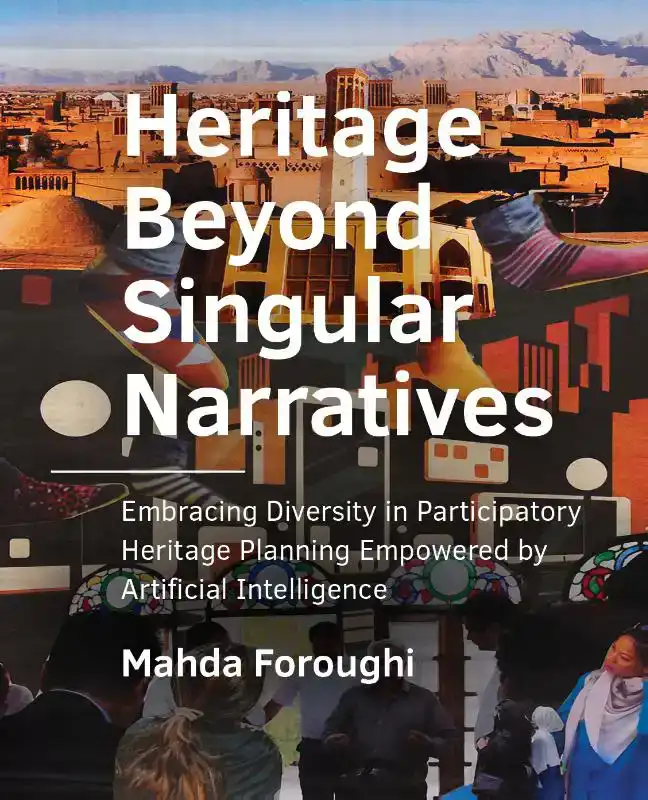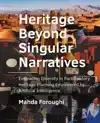- Engels
- Study
- nature & science
- technische wetensch.
- bouwkunde
- HERITAGE BEYOND SINGULAR NARRATIVES
FOROUGHI, MAHDA
HERITAGE BEYOND SINGULAR NARRATIVES
19,95incl BTW
Vertrouwd sinds 1927
Persoonlijke aandacht en advies
Vanaf 17,50 gratis verzenden NL & BE
Meer dan 150.000 artikelen online
Omschrijving HERITAGE BEYOND SINGULAR NARRATIVES
This PhD thesis explores the evolving field of heritage planning, focusing on the cultural significance of heritage properties. It advocates for a value-based approach that recognizes the diverse perspectives of stakeholders, including experts, polic
ymakers, and users. While participatory heritage aims to foster consensus-building, tensions may arise due to varying cultural significance conveyed by different stakeholder groups. Conventional research methods are time-consuming and costly, limitin
g their effectiveness in heritage planning. To address this gap, this research aims to utilize Artificial Intelligence (AI) models and information repositories, such as social media platforms, to understand the cultural significance of built heritage
from different stakeholder groups'' perceptions.
This research presents a theoretical framework that examines the factors influencing consensus-building on heritage values and attributes. Based on this framework, a public participation methodol
ogy empowered by AI is developed and tested in the case study of windcatchers in Yazd, Iran. This study compares the perceptions of three stakeholder groups: experts, policymakers, and users. The findings reveal consensus on the value of windcatchers
while highlighting differing interpretations of their significance.
The AI-empowered methodology proves effective in uncovering stakeholder groups'' understanding of cultural significance. This framework can be replicated in other case studies,
facilitating participatory heritage practices. The thesis contributes to knowledge in public participation, cultural significance, and AI in heritage planning, offering insights for practitioners and policymakers to promote inclusive heritage practi
ces. It emphasizes the importance of stakeholders'' contributions and advocates for a more diverse and inclusive approach to heritage planning.
ymakers, and users. While participatory heritage aims to foster consensus-building, tensions may arise due to varying cultural significance conveyed by different stakeholder groups. Conventional research methods are time-consuming and costly, limitin
g their effectiveness in heritage planning. To address this gap, this research aims to utilize Artificial Intelligence (AI) models and information repositories, such as social media platforms, to understand the cultural significance of built heritage
from different stakeholder groups'' perceptions.
This research presents a theoretical framework that examines the factors influencing consensus-building on heritage values and attributes. Based on this framework, a public participation methodol
ogy empowered by AI is developed and tested in the case study of windcatchers in Yazd, Iran. This study compares the perceptions of three stakeholder groups: experts, policymakers, and users. The findings reveal consensus on the value of windcatchers
while highlighting differing interpretations of their significance.
The AI-empowered methodology proves effective in uncovering stakeholder groups'' understanding of cultural significance. This framework can be replicated in other case studies,
facilitating participatory heritage practices. The thesis contributes to knowledge in public participation, cultural significance, and AI in heritage planning, offering insights for practitioners and policymakers to promote inclusive heritage practi
ces. It emphasizes the importance of stakeholders'' contributions and advocates for a more diverse and inclusive approach to heritage planning.
Specificaties
- MerkBK Books
- GroepTECHNISCHE WETENSCH (950)
- Barcode9789463667579
- LeverstatusActief
Reviews
0.0/5.0
Gemiddelde uit 0 reviews
Meest behulpzame reviews
Nog geen reviews geschreven


